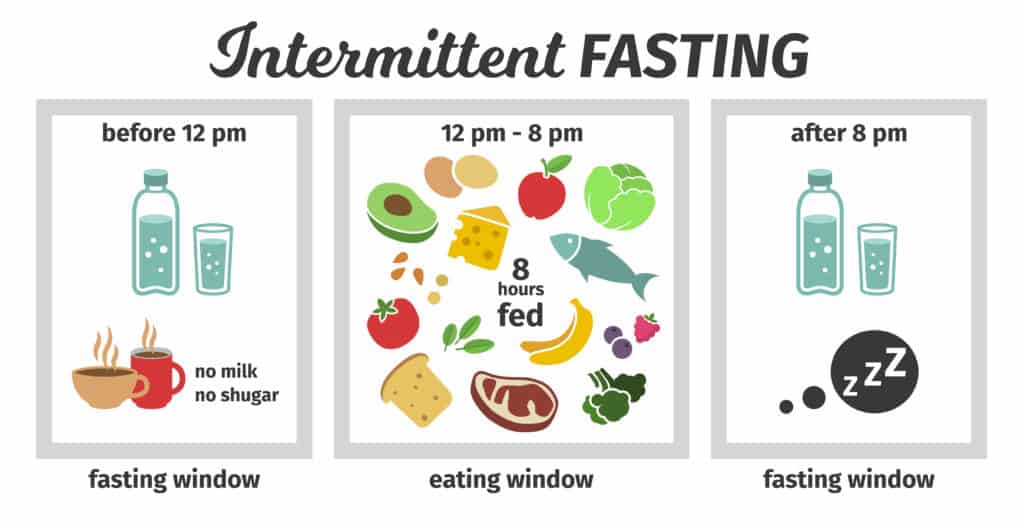Intermittent fasting is the process of alternating between periods of eating and abstaining from food. It involves a person going for 16 hours without any calories, followed by an 8-hour window to eat whatever they want. This article will explore what intermittent fasting is, its benefits, and ways you can implement it into your life.
What Is Intermittent Fasting?
Intermittent fasting is the process of alternating between periods of eating and abstaining from food. It involves a person going for 16 hours without any calories, followed by an eight-hour window to eat whatever they want. There are many different ways you can fast intermittently – some people do it every other day while others opt for the more intense version where they go 20 hours with no foods or caloric drinks (only water). The way you alternate your feeding windows will ultimately affect how well your body can regulate insulin levels and ketone production.

Intermittent Fasting Methods
There are many different ways of going about intermittent fasting — all of which involve splitting the day or week into eating and fasting periods. During the fasting period, various foods, drinks, and activities are avoided to achieve the desired results. Let’s take a look at the most popular methods:
The 16/8 Method: Fast every other day for a total of sixteen hours. For example, from 12 p.m. to 11:59 p.m., you fast and only eat within an eight-hour “eating” window that falls between the times of noon and nine o’clock in the evening on fasting days (i.e., Monday). Eat normally during your eating window while ensuring not to go over your allotted amount of calories per day with any one meal or snack — this will help prevent overeating when breaking your fast each evening at dinner time. Essentially, committing to this fasting method will mean not eating anything after dinner and skipping breakfast. You can drink coffee, and zero-calorie beverages during this fast, which will help reduce the desire to eat.
The 5:2 Method: This method involves eating what you typically eat 5 days of the week and limiting your calorie intake to 500–600 2 days out of the week.
For example, you might normally eat every day of the week except Tuesdays and Fridays. During those 2 days, you can have 2 small meals of 250-300 calories each.
The Eat-Stop-Eat: This method is similar to the 16/16 method, except that you fast for 24 hours once or twice a week.
Alternate Day Fasting: As implied by its name, alternate day fasting involves alternating between periods of eating and fasting each day. For example, eat on Monday but don’t consume anything at all until Tuesday morning — this will help prevent overeating when breaking your fast each evening at dinner time. You can drink coffee, and zero-calorie beverages such as water during this fast, which will help reduce the desire to eat.
The Warrior Method: Follow an intense workout with an 18-hour period in which no food is consumed.

Health Benefits Of Intermittent Fasting
Intermittent fasting can have powerful health benefits for weight control and the health of your body and brain. The main benefits of of intermittent fasting include:
- Decreased inflammation in the body and increased growth hormone production, which will help you maintain muscles while shedding fat.

- Improved brain function: Studies have found that intermittent fasting may enhance your mood by improving memory and cognition.
- Weight loss: Intermittent fasting can help you shed weight and belly fat without necessarily restricting calories.
- Heart Health: Intermittent fasting may reduce LDL cholesterol, blood triglycerides, blood sugar, and insulin resistance — all risk markers for heart disease.
Safety and Side Effects
Hunger is the main side effect of intermittent fasting. As with any change to your diet or lifestyle: consult a doctor before beginning intermittent fasting if you are underweight or have an eating disorder; pregnant, breastfeeding, or planning on becoming pregnant; diabetic; hypoglycemic; on a medication that impacts weight loss (e.g., antidepressants); suffer from hormone imbalances like thyroid disease.
Takeaway
Intermittent fasting is not something that everyone needs to try. It’s simply one of many lifestyle approaches that can better your health. Eating real food in moderation, training, and getting enough sleep are still essential to a healthier lifestyle.
There is no universal approach when it comes to nutrition. For example, while intermittent fasting works for some people, it might not help others. The only way to find out if it works for you is to try it out.
